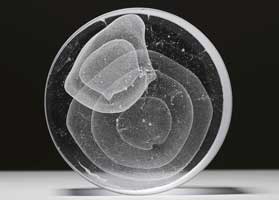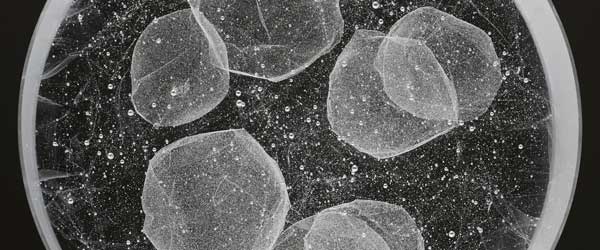
For glass artist Livvy Fink creative inspiration can come from the most unexpected sources – she was listening to the news one morning last spring when she heard how a computer programme developed to spot distant planets in space is being adapted by cancer researchers to identify the most aggressive cancers among thousands of microscopic images of tumour cells.
She immediately recognised connections with her artistic work and wanted to find out more. Livvy explains, ‘When people see my work they most often perceive either the micro or macro worlds of cells or galaxies. It has been described as if one is faced with a world that we would not normally be able to see.’
A meeting with the scientists behind the news story, astronomer Dr Nicholas Walton and clinically-trained researcher Dr Raza Ali, resulted in a novel art-science collaboration. They drew up a proposal to pool their expertise and the Lens project was conceived.
Livvy and poet Ezra Rubenstein are now starting to work with astronomers from the Institute of Astronomy at Cambridge University and biomedical scientists from the Cancer Research UK Cambridge Institute, having received funding for the Lens project from the Wellcome Trust.
Over the next few months they will explore new ways of visualising and interpreting digitally acquired data from modern telescopes and microscopes. The choice of glass as the main medium for this project is significant due to its extensive use in science to extend the limits of human vision by refracting and reflecting light.
Livvy Fink has developed a unique technology for shaping glass using a fusion of hot and cold glass processes. For the Lens project she will translate complex digital data from telescopes and microscopes into 3D objects to create visualisations of distant galaxies and highly-magnified cells. The resulting shapes will be embedded into more glass and, after extensive cutting and polishing, they will appear as ethereal forms floating within clear glass surrounds.
Ezra Rubenstein is a poet, philosopher and mathematician, and he is particularly interested in philosophical issues relating to science and its boundaries. In this project he is exploring ways of using creative writing to bridge the gap between appearance and actuality, between mind and matter, between language and logic, between one person and another.
Livvy and Erza will draw on the parallels between space science and biomedical science: astronomers search the infinitely large distances of space to determine the make-up of our universe while cancer scientists zoom into the infinitely small details inside our cells to work out what goes wrong in cancer cells in order to diagnose the disease accurately and to find better treatments. Although dealing with very different types of information – using telescopes to trawl through space and microscopes to see inside cells – both generate massive volumes of data and look for common patterns.
The research that triggered Livvy Fink's imagination is providing a powerful new tool to identify the most aggressive cancers. Until now pathologists had to pick out suble differences in the staining of cancer cells by looking at each of the cell samples on a slide under a microscope, which is time-consuming and prone to human error. But the new automated method adapted from a computer programme to interpret deep sky images enables microscopic cancer cell images to be analysed faster and more accurately.
The new technology is a prime example of scientists collaborating across different disciplines to produce new insights into the causes and diagnoses of cancer. And the Lens project is facilitating further collaboration with artistic disciplines enabling the scientific messages to be enriched, explained and brought into the public arena.
There will be an exhibition of the art works produced during the Lens project at next year’s Cambridge Science Festival and the Cambridge Festival of Ideas 2014. The project team will also be developing workshops for selected local schools.
















